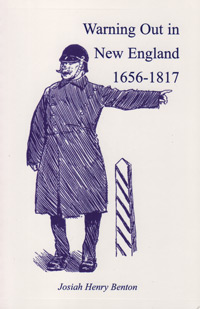 Americans have come to expect certain freedoms and civil rights. One right is it to live just about anywhere one can afford to without undo legal prejudice. Sure, there may still exist racial, religious, or other such biases, but legally this cannot stop people from moving city to city or neighborhood to neighborhood. Looking back through history such freedoms were not always there. The Constitution and the subsequent Bill of Rights and other amendments provided for many added freedoms never before experienced in the world. However, not all the freedoms one expect were immediately available. During the colonial years, and even into the nineteenth century, people did not always have the right to move into a community or town without express permission. Likewise, people, individuals and families, were often sent from their homes by their own neighbors and community. Often these were good people. The excising of people from their homes was called “warning out.” Warning Out in New England 1656-1817 describes this old English law and its application in early American society.
Americans have come to expect certain freedoms and civil rights. One right is it to live just about anywhere one can afford to without undo legal prejudice. Sure, there may still exist racial, religious, or other such biases, but legally this cannot stop people from moving city to city or neighborhood to neighborhood. Looking back through history such freedoms were not always there. The Constitution and the subsequent Bill of Rights and other amendments provided for many added freedoms never before experienced in the world. However, not all the freedoms one expect were immediately available. During the colonial years, and even into the nineteenth century, people did not always have the right to move into a community or town without express permission. Likewise, people, individuals and families, were often sent from their homes by their own neighbors and community. Often these were good people. The excising of people from their homes was called “warning out.” Warning Out in New England 1656-1817 describes this old English law and its application in early American society.
The author’s great-grandfather “a good soldier, a devout Christian, and a peaceable citizen,” was a victim of this law. This law, when “properly implied,” gave a town the legal right to “exclude from inhabitancy persons for (whom) they did not desire to become responsible.” In researching the law and what happened to his great-grandfather, the author discovered this law was exercised frequently. In accordance with the law, residents couldn’t sell their homes and property to strangers with out town permission. Even family members were often denied permission to live within a town due to a lack of community approval.
This book reviews the law in detail, including its application. Some never left when “warned out.” Some paid taxes, owned property, and even held office without ever gaining actual rights of inhabitancy. Delve into this unusual law that may have affected the lives of many of your own ancestors.
Table of Contents
Chapter 1. Introduction
- Example of Warning Out
- Inhabitancy
- Land Titles in New England
Chapter 2. Admission of Inhabitants
- Grants of Land by Towns
- Restraint of Alienation of Lands
- Proceedings in Boston and Other Massachusetts and Plymouth Towns
Chapter 3. Massachusetts Colony and State Laws
- Plymouth Colony Laws
- Further Illustrations of Town Action as to Inhabitancy, Alienation of Land, Warning Out, etc.
Chapter 4. Inhabitancy and Warning Out in Connecticut
- Early Colony and State Laws
- Illustrations of Action of Towns, etc.
Chapter 5. New Hampshire Colony and State Laws
- Action of Towns as to Inhabitancy, Warning Out, Relief of the Poor, etc.
Chapter 6. Rhode Island Colony and State Laws as to Inhabitancy Relief of the Poor, Town Settlement, etc.
- Maine and Vermont State Laws as to Warning Out, Inhabitancy, Settlement, Relief of the Poor, etc.
Chapter 7 The Length of Time Warning Out was practiced
- Effect of Warning Out, How Avoided
- Value of Warning Out Records
- Summary as to Reason for Warning Out, etc.
Chronology
Index
Warning Out in New England 1656-1817 is available from Family Roots Publishing; Item #: HBB0730.